

P WERISE
Our Alliance’s Vision GLC’s Bold Plan for 2030 Breakthrough Stories

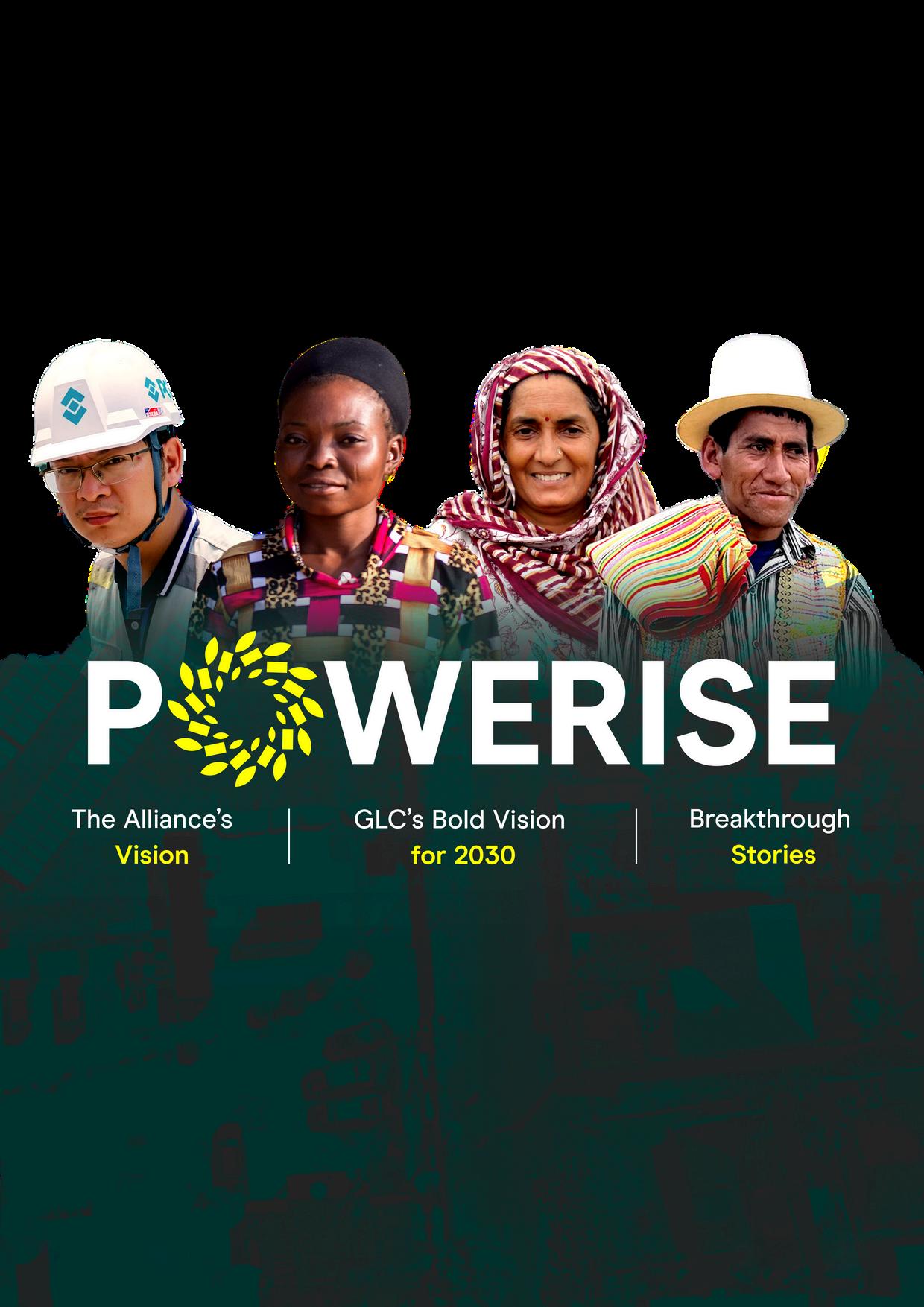
Fromthe CEO’s Desk
Togetherwecan ChangeEnergy and ChangeLives
In Nigeria, Blessing stores her produce in a newsolar-powered cold room, eliminating food wasteand bringing newcommerce tothe community. In India, Renu’ s newsolar-powered grain mill has doubled her profitsand transformed her family’s life In Haiti, Rose sells cold drinksfrom a newsolar-powered freezer earning enough tosend her children toschool
These stories (see page 10), and so many more, showhowthe global energy transition is morethan an environmental imperative When paired with the rightinvestments, training and tools, it is a transformativeopportunity tocreatejobs, spur economic developmentand change lives.
Welivein challenging times Escalating geopolitical tensions arepulling attention and critical funding away from energy transition and global development But that’swhen our work becomesmorecritical than ever. Never has the need for bold collaboration been moreimportant.
GEAPP was created for this moment Since our launch at COP26, our growing Alliance of public, privateand philanthropic partnershas shown that truecollaboration is the only way todrivelasting, systemic change.
Wesee this in the success of the Energizing AgricultureProgram in Nigeria (see page 35) and the diverse stakeholdersparticipating in ENABLE, a coordinated effort toscale up battery storage across Southeast Asia (see page 32). And wesee it in Mission 300, our collaborativeeffort tobring electricity and economic opportunity to 300 million people in Africa by 2030 (see page 34).
By working together, our communit and Latin America and the
The World Economic Forum which I accepted on behalf stands as testamenttothe
I hope you enjoy this second your effortstocollaborateand sharing moreabout our impactas
Yoursin partnership,
Woochong Um, Chief Executive Officer, Global Energy Alliance
for People and Planet (GEAPP)
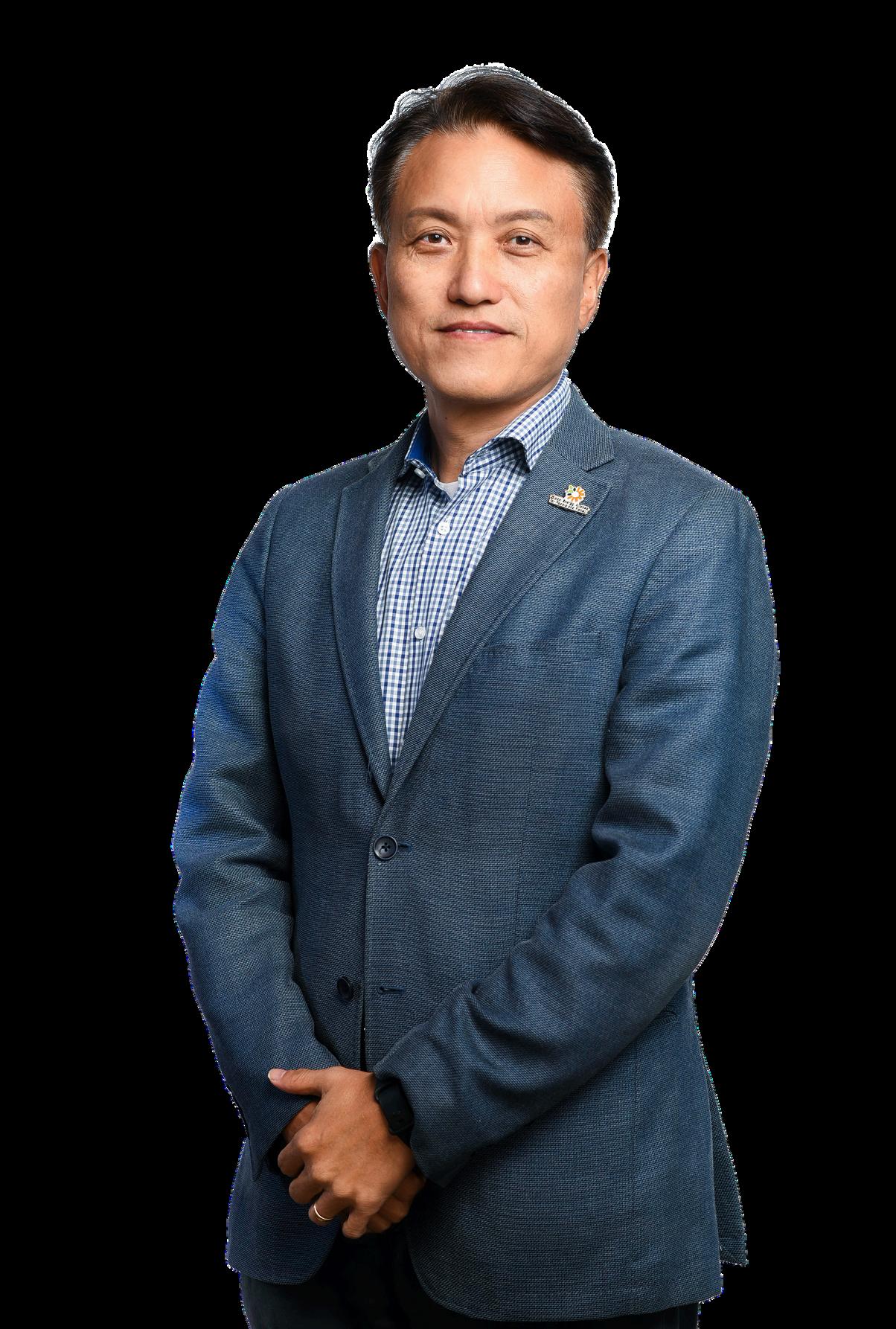

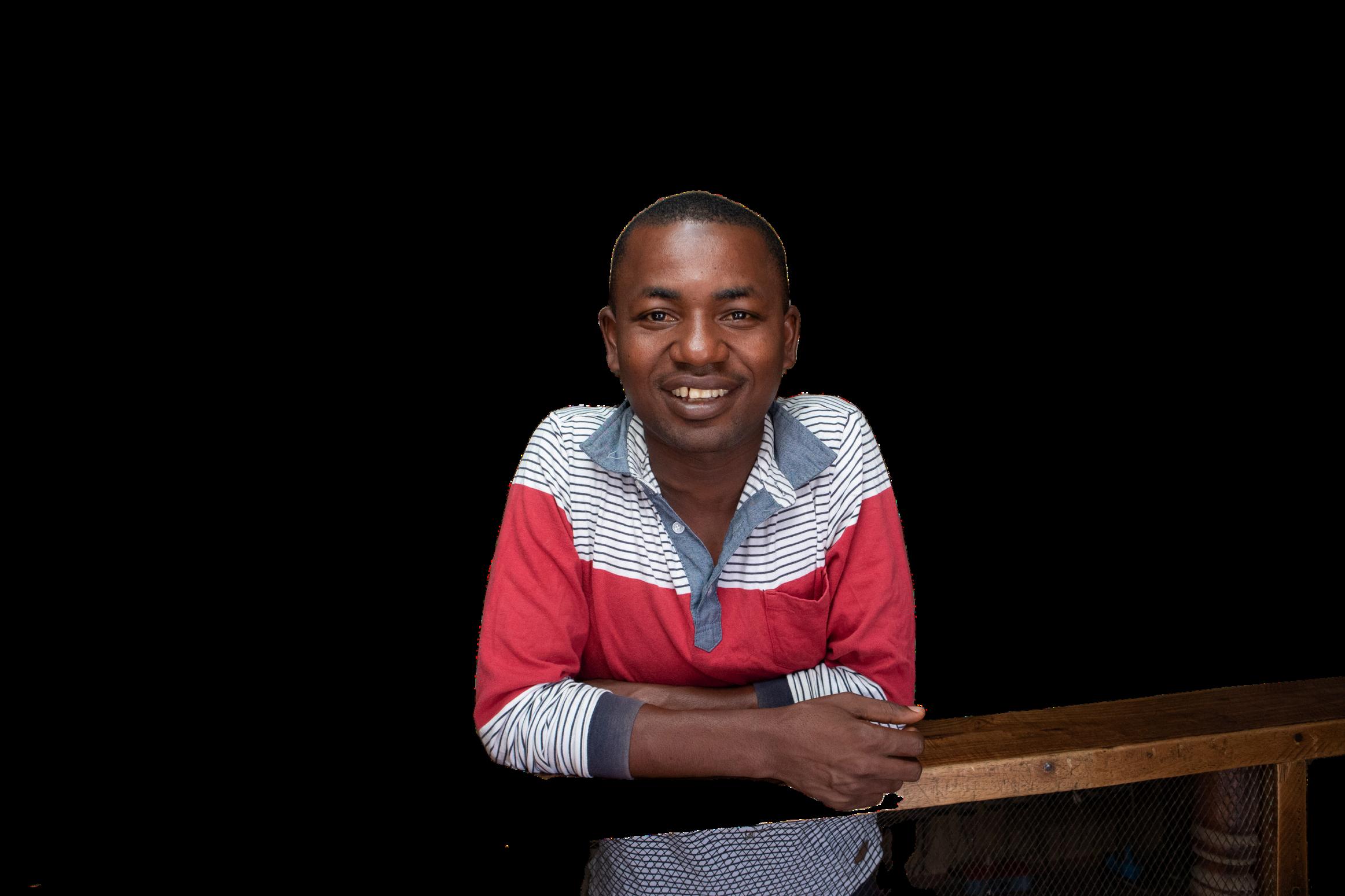


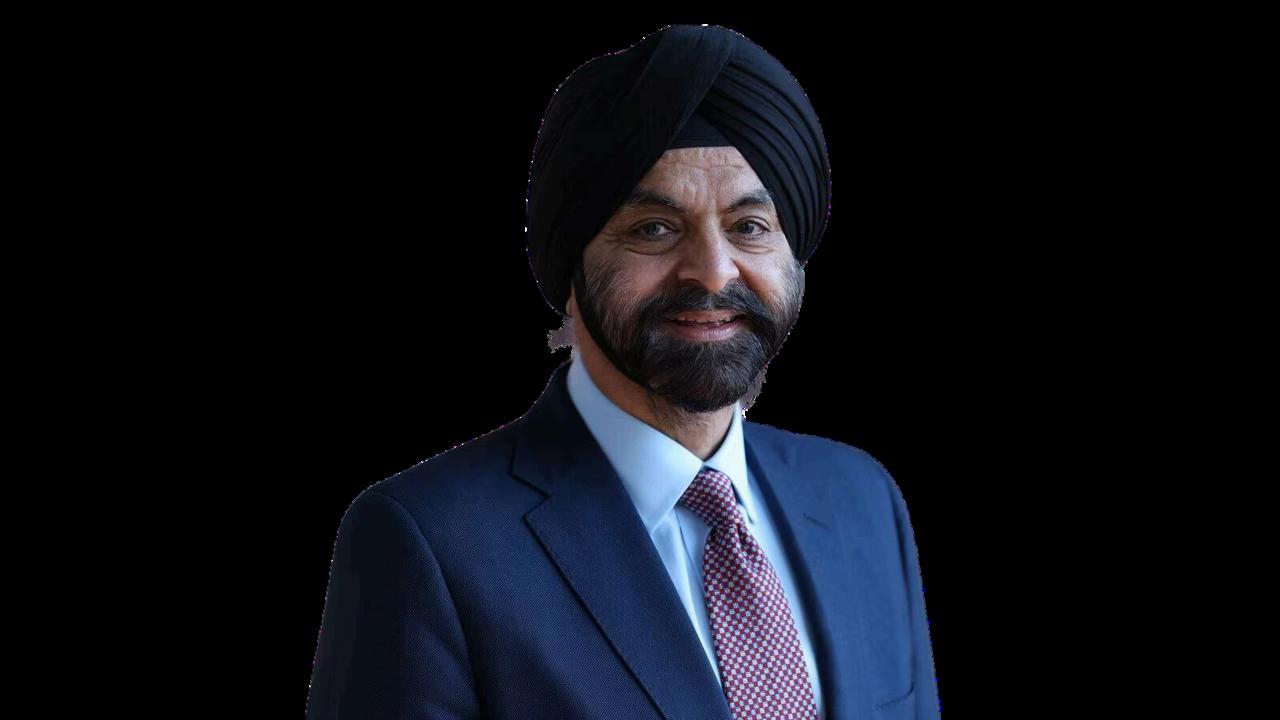
Leading to Drive Impact
GEAPP
Leadership
Council’s
Bold Vision for 2030
Since its launch in 2022, the GEAPP Leadership Council (GLC) has served as a powerful platform for translating bold ideas into collective action. With a mission to end energy poverty and accelerate a just energy transition, the GLC mobilizes its members and global partnerships to scale solutions, drive systemic change, and align global priorities. In this issue of PoweRise we focus on two major priorities: Productive Africa and our BESS Consortium.
Productive Africa: Driving jobs and growth in Africa
While electrification in Africa has expanded, many investments fail to turn access into economic opportunity, with limited job creation or enterprise growth At the same time, many distributed renewable energy solutions (DRE) are not bankable due to limited demand for energy in certain communities
GEAPP’s new Productive Africa program will address these shortfalls by ensuring that new energy connections drive productive use, by investing in powering agriculture, small businesses and local manufacturing. Increased incomes from these activities will drive economic growth and wellbeing across local communities, creating jobs and improving 17M livelihoods by 2030.
Productive Africa will align stakeholders around one measurable challenge and a shared delivery strategy by embedding productive use of energy (PUE) in national plans. The model ensures that productive use is no longer a peripheral initiative but a core development priority

Access to electricity is a fundamental human right. Without it, countries and people cannot thrive. Our mission to provide electricity to half of the 600 million people in Africa without access is a critical first step To succeed, we must embrace a simple truth: no one can do it alone Governments, businesses, philanthropies, and development banks each have a role and only through collaboration can we achieve our goal.
– Ajay Banga, GLC member and President of the World Bank Group

BESS Consortium: Collaborative action accelerates battery energy storage systems, globally
The BESS Consortium, in its second year, has achieved significant milestones across key focus countries. The Alliance now has more than 2 GW of projects developed in collaboration with countries and partners with the larger goal of achieving 5 GW by 2030. The Consortium is actively collaborating with diverse partners, including more than 20 utilities across lower and middle income countries, to support utilityscale project development, regulatory support, and post-commissioning support. India recently launched a first utility-scale, standalone battery energy storage system project, the largest of its kind in South Asia. Led by the BESS Consortium, including GLC member Rocky Mountain Institute, this project will enable more than 12,000 lowincome households and businesses to receive more affordable, reliable power thanks to the first-of-its kind battery installation in New Delhi. Commissioned in a record-breaking 10 months since the start of construction, the project unlocked a tariff which was 55% lower than previous benchmarks in the country. In its first three months of operations, the project delivered
100 cycles of complete charge-discharge, providing over Rs 25 million in power procurement cost savings.
In Malawi, we successfully launched the 20MW/30MWh BESS project with ESCOM, supporting 100 MW of solar and improving grid resilience and power reliability in schools, hospitals, homes and businesses.
In Barbados, along with IDB, RELP, the Regulatory Assistance Project, National Renewable Energy Laboratory, and IFC, we are supporting the country’s first BESS auction for 50MW across multiple systems. The auction will be open to international bidders, providing access to leading battery technology at competitive prices. BESS will enable Barbados to meet its goal of transitioning to 100% renewable energy by 2030 and reduce costly energy imports.
In Southeast Asia, with ADB, we have launched the ENABLE platform to deliver timely technical assistance and concessional capital to countries like Vietnam, Mongolia, and Cambodia over a three-year period. ENABLE is a first-of-itskind regional initiative in Southeast Asia providing end-to-end support for BESS alongside Alliance partners.

We are facilitating targeted engagement with the Long Duration Energy Storage (LDES) Council and other private sector entities to foster the growth of LDES. In the Indian state of Gujarat, the first LDES pilot for low- and middle-income countries is currently under development
The Consortium is also supporting the development of first-of-a-kind merchant BESS business models in India and Africa, aiming to tender out 500 MW of new projects in priority regions, launch a Global BESS Knowledge Portal, and a Global

A Defining Year Ahead
Investing in the Alliance

A Conversation with Marilia
Bezerra, Chief Programmes Officer, IKEA Foundation
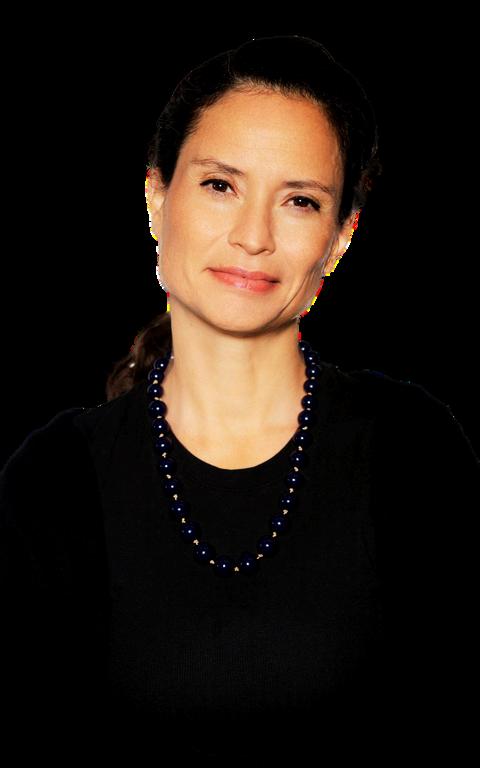
Q: As a founding member of GEAPP, what is your vision for the Alliance?
A: IKEA Foundation was one of the founding partners of GEAPP I’m joining the board as the Alliance steps into a new phase as an independent entity dedicated to expanding energy access, creating new jobs, and cutting the world’s carbon emissions. I’m excited to be part of the team helping renew and realign the strategy to meet the realities of the world today. I look forward to asking some good questions and helping make change at the scale and speed the world needs.
I was born and brought up in Brazil but have worked my entire professional life in the US. I grew up in a country emerging from a dictatorship, facing enormous challenges and with poverty right in front of my eyes. This gave me a strong sense of commitment and an understanding that things can change and environments can shift for the better The world is facing a period of great disruption But experience has taught me that by working hard and working together, we can move forward in the right direction
Q: Alliance-building is hard. What would it take for GEAPP to succeed?
A: My role as Director of Commitments at the Clinton Global Initiative in early 2000s gave me my first taste of how easy it is to say we want to collaborate but how hard it is to actually do it Building networks and alliances has been a through line in my career. I have seen many alliances emerge and become successful over time. I have battle scars as well as some good lessons to learn from. It’s important to think collectively in a moment when solutions must be collective. We need to ensure all the relevant partners are around the table, especially local partners, if we are going to solve problems in the real world.
The IKEA Foundation joined in creating GEAPP because we really see the intertwined challenges of energy access, climate change, and the need to put people at the center of our solutions. As global temperatures rise and socio-economic inequity widens, this has gone from being urgent to being an emergency
At its heart, just energy access is a systems problem It comprises of regional, national, and sub national systems – including governments, businesses, and communities along with philanthropies involved in addressing climate change, energy transition, food security, global health, and much more. The Alliance was founded to bring all the actors together and to form the connective thread to help us all build a fairer, prosperous, and a more resilient world.
From Vision to Action
A conversation with Jasandra Nyker
Managing Partner, Saja Climate Partners
Q: What motivated you to join the board at GEAPP?

A: I’ve had two decades of experience in climate technology and investment globally, including a fair portion of time in the Global South. I have had extensive strategic and financial experience in Africa, scaling renewable energy businesses and then driving their growth leveraging blended finance structures as needed. More recently, I’ve worked in Latin America and Southeast Asia, which are all markets that are pivotal to the Alliance’s mission and success. I know how things need to be done so that projects and businesses can be scalable and sustainable.
Q: You’re joining us at a challenging time, globally. Why is the Alliance so important at this point in history?
A: Now more than ever, there is a strong caucus that doesn't believe we are in a climate crisis At the same time, the just energy transition is more urgent than ever No single entity can solve for this The Alliance’s special skills are leveraging the public and private sectors and building partnershipsalliancing I don't know any other organization with such a strong ability to bring government, philanthropy, financial institutions, and the private sector together to create scalable impact
Q: What was it about the Alliance that first caught your eye?
A: I saw a video of a woman in rural India who has a mill powered by solar energy (see story, page 10) It had transformed her livelihood and given her family a sense of a future And there was another story of a female solar installer in Indonesia who helped electrify her community. I had to ask who was behind this and how I could use my experience to strengthen their ability to deliver. The Alliance has had its first three years. It has tested a range of models and seen what works and what doesn’t. Now it’s in a position to take those learnings and scale.
Q: What would you say to anyone thinking of joining the Alliance?
A: Ultimately, positive economic outcomes will drive the energy transition Today, access to capital is more constrained and investors want to know that their dollars are having the greatest impact The Alliance’s success in India is an incredible example of impact relative to dollars spent. So, we have evidence of what works and we are now uniquely positioned to apply learnings in other markets. GEAPP is well placed to use its catalytic capital and alliance-building expertise to de-risk projects, and steer both governments and development organizations toward unlocking further investment and accelerating deployment. I'm highly optimistic about what we can deliver in the next five years.
CHANGEENERGY. CHANGELIVES. ENERGY LIVES
Energy delivery is only one piece of our Alliance’s work. True impact comes when communities have all the tools and resources they need to use energy to profit and thrive. These three women show us how renewable energy, and the tools to use it, changed not only their lives, but the lives of those around them too.
India: The Business of Transformation
Renu Patel, co-owner and operator of a grain mill in Budhipur, India, has always been in the business of transformation. With rooftop solar, she’s made her flour mill cleaner, more efficient, and more profitable.
“There is a visible difference in our earnings,” says Renu. “A lot of money is saved for our household.”
With more affordable and efficient energy, Renu can run the mill for longer, almost doubling her output and reducing costs by 25%. Renu and her husband are using the extra profits to pay for their children's education.
She has also found a new level of independence, no longer needing to crank a diesel generator but instead turning the mill on with the press of a button. “I had never imagined I could run the mill on my own,” she says. She has even installed a second machine to increase production.
Renu's customer base has swelled to nearly 100 people due to her sharing a portion of her savings with them, and the community has benefited from improved air quality because of solar panels.
“There used to be a lot of pollution in the surroundings due to the smoke emitted by diesel,” says Patel. “But these solar panels won’t generate any pollution, so people around us will stay healthy too.”
Through our Alliance’s rooftop solar program, we have equipped more than 1,200 businesses like Renu’s with clean power since 2022. Our goal is to reach 10,000 by 2025.
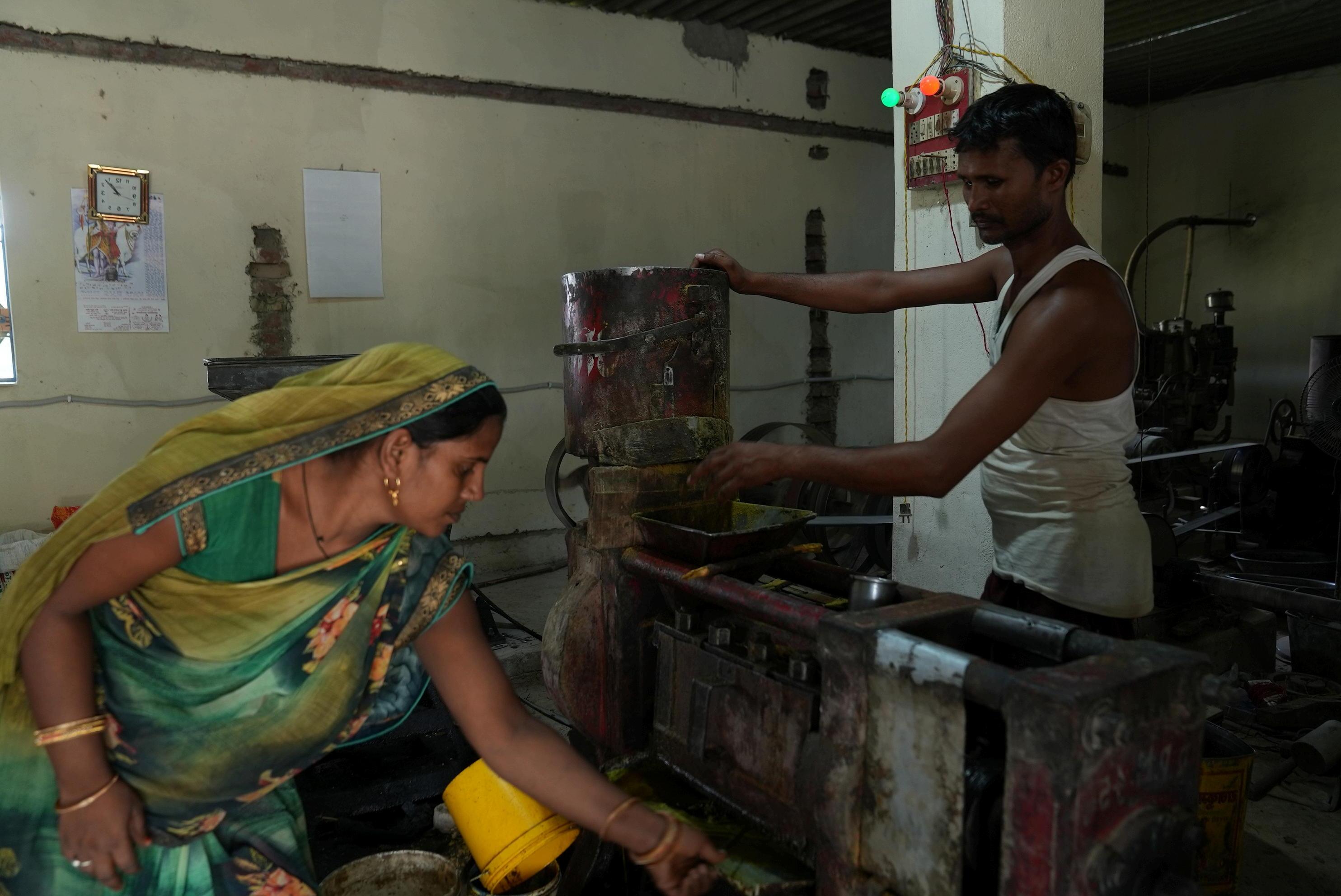
RENUPATEL

ROSE-MARIE
Haiti: Powering Small Businesses for Big Impact
For bodega-owner Rose-Marie Gades, sales picked up when she found a way to help her customers cool down.
In the small town of Roche-à-Bateau, Haiti, Rose was able to start selling cold drinks and quadruple her income when she received a freezer from the Haitian nonprofit, Fonkoze Foundation, in partnership with GEAPP The program aims to increase access to electricity by stimulating demand through entrepreneurship.
“When the power came to town, everyone was happy because of the change it brought, ” says Rose. “I decided to use this electricity to sell cold drinks. ”
While Rose enjoys her thriving business and her customers enjoy cold drinks, Rose' s children are enjoying something else — school.
“The freezer helped me expand my business and now I have enough money to buy school supplies and send them to school, ” she says.
With only 50% electrification nationwide and just 2% in rural areas, Haiti faces immense challenges. To make mini grids financially viable, our Alliance works with entrepreneurs like Rose to grow demand. Over 250 women-led businesses have used new access to electricity to expand, and grid operators now earn more and can expand further too.
Nigeria: Sun-Blessed by Fresh Opportunities
For Blessing Bitrus, a fish trader in Nigeria’ s Kiguna community, business is good.
Under the hot sun, it used to be a race against time to get the day ’ s catch of tilapia and catfish to the market and sell it while still fresh. Blessing was forced to keep her prices very low Even so, on most days, nearly half her fish went to waste
Now, a solar-powered cold room has changed everything.
“Since this cold room was brought to our community, it has been very helpful , ” says Blessing. “Now our fish does not spoil, and we do not have to sell them very cheaply. ”
The cold room has brought fresh opportunities to Blessing’s community too. Around 100 local fishers now use the cold room The reduction in waste and the ability to sell fish further afield where it can command higher prices, has increased average earnings by 30%
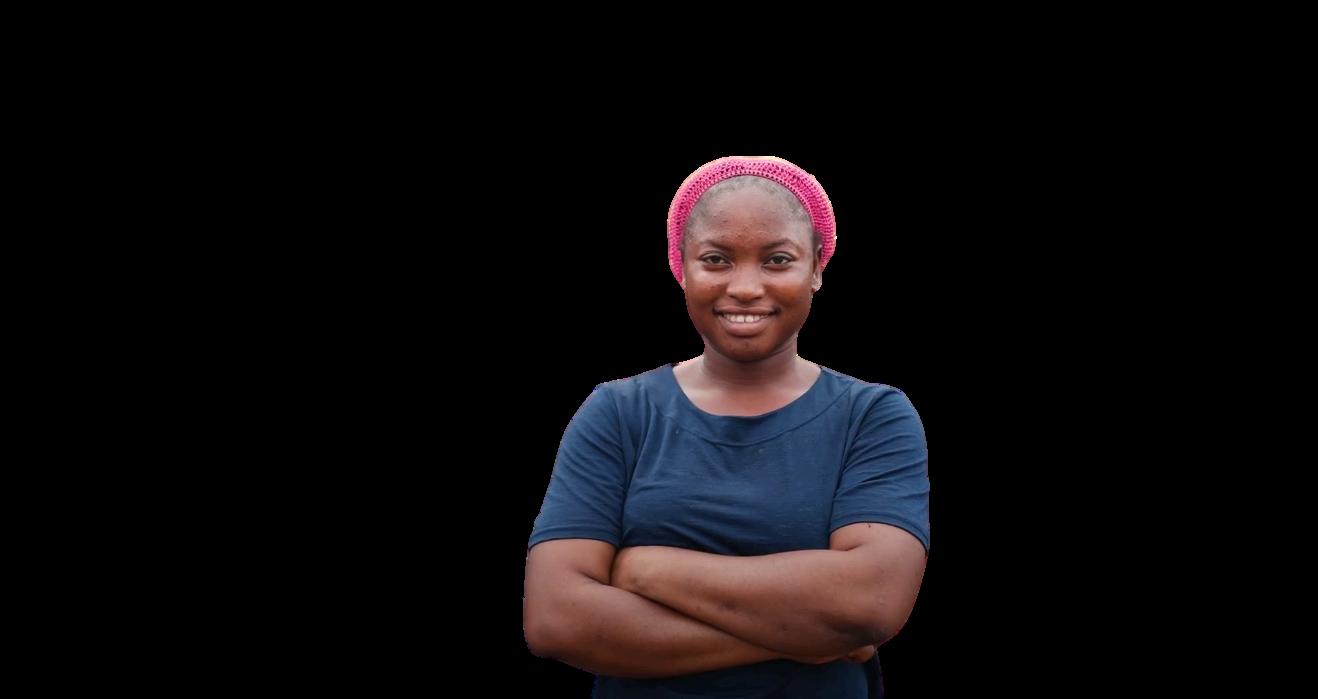

Uniting for Clean Energy
Our Alliance received the inaugural Giving to Amplify Earth Action (GAEA) Award for CatalyticPhilanthropic-Public-Private Partnership at the World Economic Forum in recognition of our efforts to develop and scale renewable energy solutions in Asia, Africa, Latin America and the Caribbean.
WATCH MORE



Strengthening India’s Energy Grid
Together, our Alliance is helping India achieve its goal of net zero by 2070 and accelerate the shift to renewables. We do this through solar-powered mini grids that improve jobs and livelihoods, and by employing groundbreaking, utility-scale batteries and cutting-edge digital tools to improve grid reliability.
The Digitalization of Utilities for Energy Transition (DUET) program focuses on enhancing network planning and transforming power distribution networks through grid asset digitization, DRE integration, BESS, and other energy efficiency measures Through a comprehensive technology suite, DUET enables end-to-end digitalization that allows utilities to capture every grid asset.
The project’s primary objectives are:
Modernization of utilities
Enabling DRE integration
Ensuring the accuracy and reliability of digital asset records
In collaboration with Alliance members including the Rajasthan State Department of Energy, the city utility, Jaipur Vidyut Vitran Nigam Ltd., and technology providers, we are supporting the deployment of advanced network mapping and load flow analysis tools to better plan and optimize power demand management
The larger goal of the project is to develop a digital twin of the state grid and the development of a scalable model for nationwide, and even global, implementation.
A core enabler of this digitalization is the deployment of mappers, a specialized workforce who are responsible for on-the-ground asset data collection, combining physical endurance with technical precision.

Regional Update: Africa
Acting Together to Catalyze a Green Energy Revolution for Everyone
In Africa, our Alliance plays a key role in Mission 300, a public-private-philanthropic ambition led by the World Bank and the African Development Bank to connect 300 million people to electricity in Sub-Saharan Africa by 2030.
Mission 300 will drive last mile energy access, jobs, and livelihoods, as well as major upgrades to electricity infrastructure, through DRE and BESS We are supporting the initiative through Compact Monitoring and Delivery Units, which are providing high-level government support across the continent to help unlock institutional bottlenecks and accelerate delivery at scale
Through Productive Africa, we will ensure energy connections drive productive use by investing in powering agriculture, energizing SMEs, and local manufacturing The Alliance is also supporting South Africa as a vital proof point for the just transition in the Global South, avoiding 20 million tons of carbon emissions per year while creating 30,000 jobs.
Visit by The Rockefeller Foundation’s Mission 300 Delegation
Led by Executive Vice President for Programs Elizabeth Yee, the delegation visited Nigeria to assess clean energy progress. Hosted SEforALL and GEAPP, the team toured the Universal Energy Facility project sites, witnessing firsthand how clean energy is improving lives. They also convened a roundtable with Nigeria’s Ministry of Power and Ministry of Finance to discuss the country’s Energy Compact and Mission 300’s implementation plans and progress. The visit reinforced collaboration toward scaling sustainable energy access in Nigeria.
SHE Learning Festival
The Africa team participated in the Solar Harnessed Entrepreneurs (SHE) Project Learning Festival Funded by the Rockefeller Foundation, SHE supports over 6,000 women across nine districts with training and low-interest loans for solarpowered appliances.
These appliances have helped women reduce spoilage, boost productivity, and grow their businesses, leading to an average 25% income increase. CARE, PowerLeone, PowerGen, and GEAPP are working on solutions to improve energy reliability and affordability.
Commissioning of Robinyo Interconnected Mini Grid
In collaboration with RMI and other partners, we commissioned a mini grid that will bring power access to over 5,000 periurban residents. This innovative solution combines grid supply with distributed energy resources from solar PV and battery storage to deliver reliable, clean, and cost-effective power. Generating approximately 545,000 kWh annually, the project will displace 420 metric tons of carbon emissions each year.

Malawi Presidential Delivery Unit Convening
The Malawi Presidential Delivery Unit convening showed how an Alliance grant unlocked energy and ag-energy projects to stakeholders. By supporting Malawi’ s PDU, GEAPP is facilitating faster household electrification, powered agricultural cooperatives, accelerated mini grid commissioning, cost-efficient agricultural tariffs, and the expansion of the Mozambique-Malawi interconnection transmission line. The Alliance is also partnering with nine other countries, demonstrating how collaborative partnerships can unlock energy access to improve livelihoods.
Digitalizing Grids Workshop
The workshop in Nigeria brought together utilities, funders, tech providers, and knowledge partners to explore digital and AI solutions for grid modernization Discussions highlighted the need for improved operational efficiency and collaboration to support Nigeria’ s energy access and climate goals.
Enabling the Clean Energy Ecosystem in India Regional Update: Asia
The Alliance is committed to supporting India’ s energy transition. In partnership with governments, think tanks and sectoral stakeholders we have been facilitating the roadmap for the adoption
Our collaborative transition to at le stability, and stre Rural Livelihood M the Decentralized endeavor that fou designated as the Alliance’ s Multi-D solar energy proj
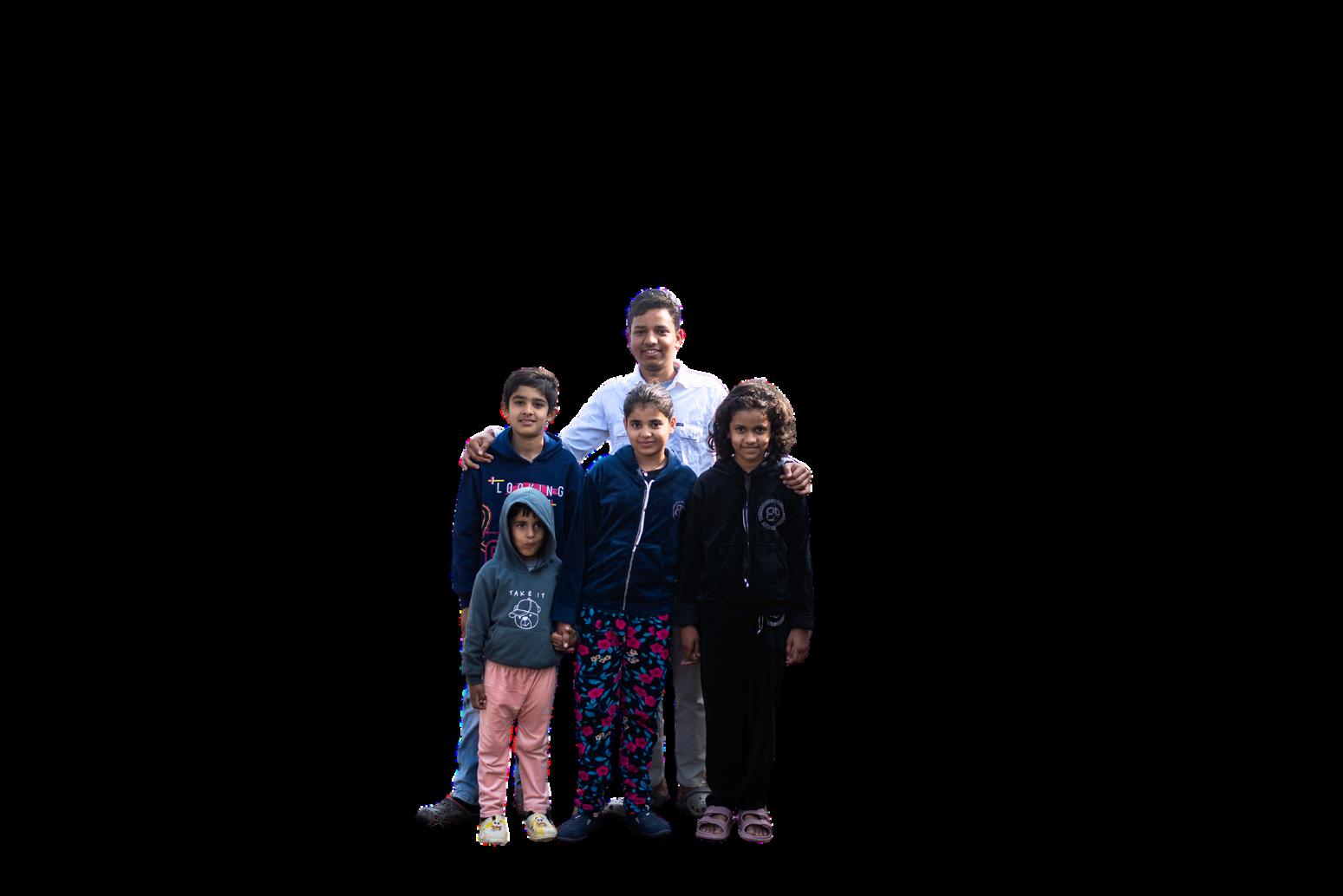
Dr. Rajiv Shah and Woochong Um in India
GEAPP CEO Woochong Um, and President of The Rockefeller Foundation, Dr. Rajiv Shah, visited India in January to deepen understanding of our on-ground efforts and reaffirm support for India’s energy transition Highlights of the trip included site visits, meeting senior government officials and partners.
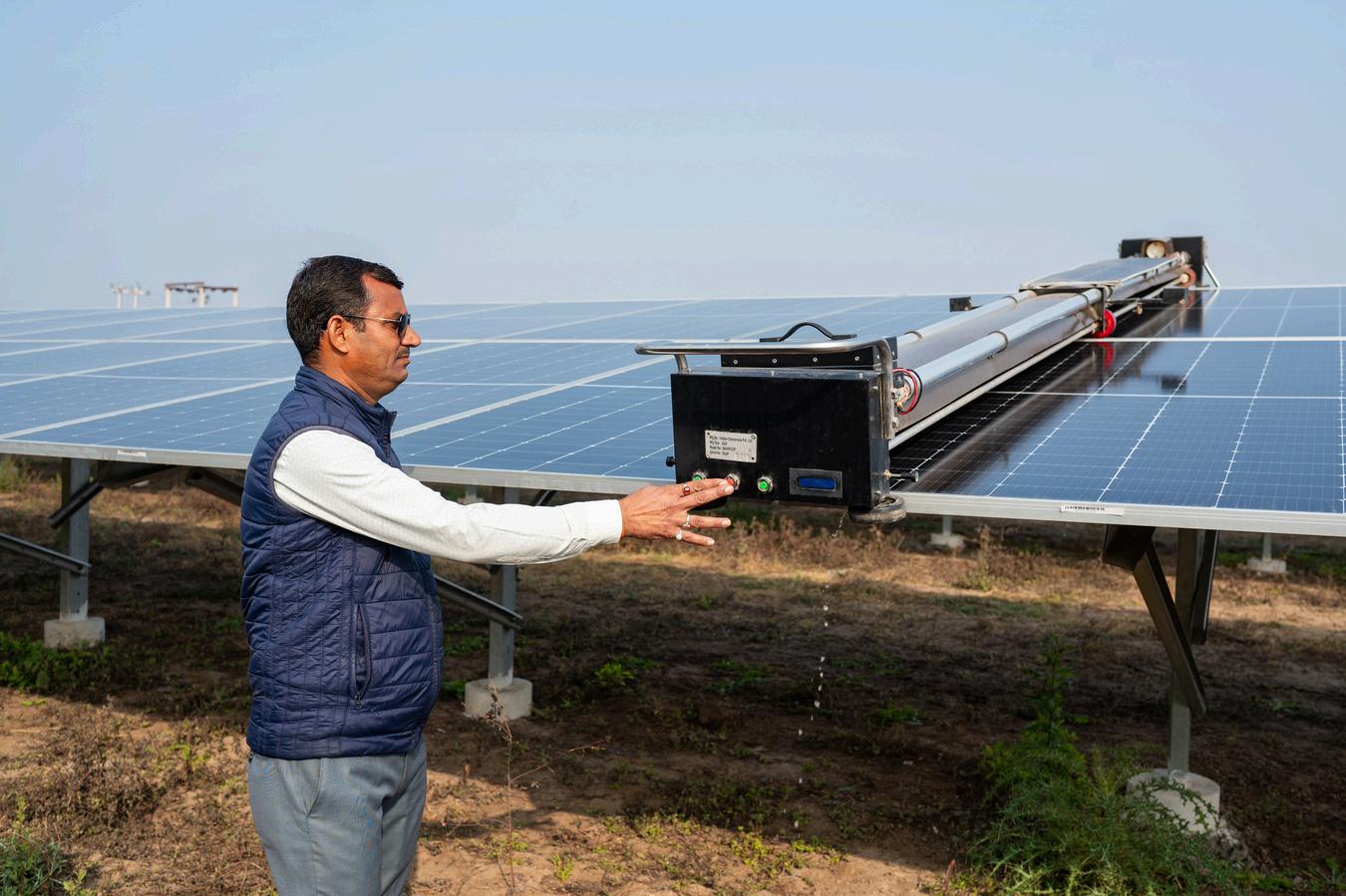
Last Mile Focus
Nirmal Das Swami's solar panel farm has improved electricity

Strengthening Collaboration for Southeast Asia in Singapore
Woochong Um’s Singapore visit featured engagements with philanthropic leaders and partners, including Asia Philanthropy Circle and Philanthropy Asia Alliance He also met with the Monetary Authority of Singapore and the Asian Development Bank to deliberate on green energy transition and advance the Financing Asia’s Transition Partnership initiative, aimed at unlocking innovative green projects in the state.
We also strengthened alliances at Ecosperity, the flagship sustainable investing event from Singapore-based investment company, Temasek. The Alliance actively participated in sessions on blended finance, storytelling, grid modernization, and multi-stakeholder collaboration.
Bringing the Focus on Energy Access in the Islands of Indonesia
The de-dieselization program by Indonesia’s state electricity company PT PLN (Persero). supported by GEAPP’s technical assistance, aims to minimize the dependence on conventional fuels, increase the share of renewables in the energy mix, and improve reliability while reducing electricity costs.
We are also tapping into opportunities to power island livelihoods and remote communities. With partners, we are helping develop community-based cold chain facilities and solar ice makers for fishing communities. These technologies can enhance access and reliability of power for small businesses.
We have been actively working in alliance with the Government of Indonesia to monitor and highlight the progress of the country’s energy transition initiatives. We introduced an AIdriven approach for site selection of PV and BESS, optimizing the process and improving field survey efficiency across 50 sites.
Working together wit PLN’s commitment to exemplifies collabora PLN to accelerate en Indonesia.
President, PLN, In
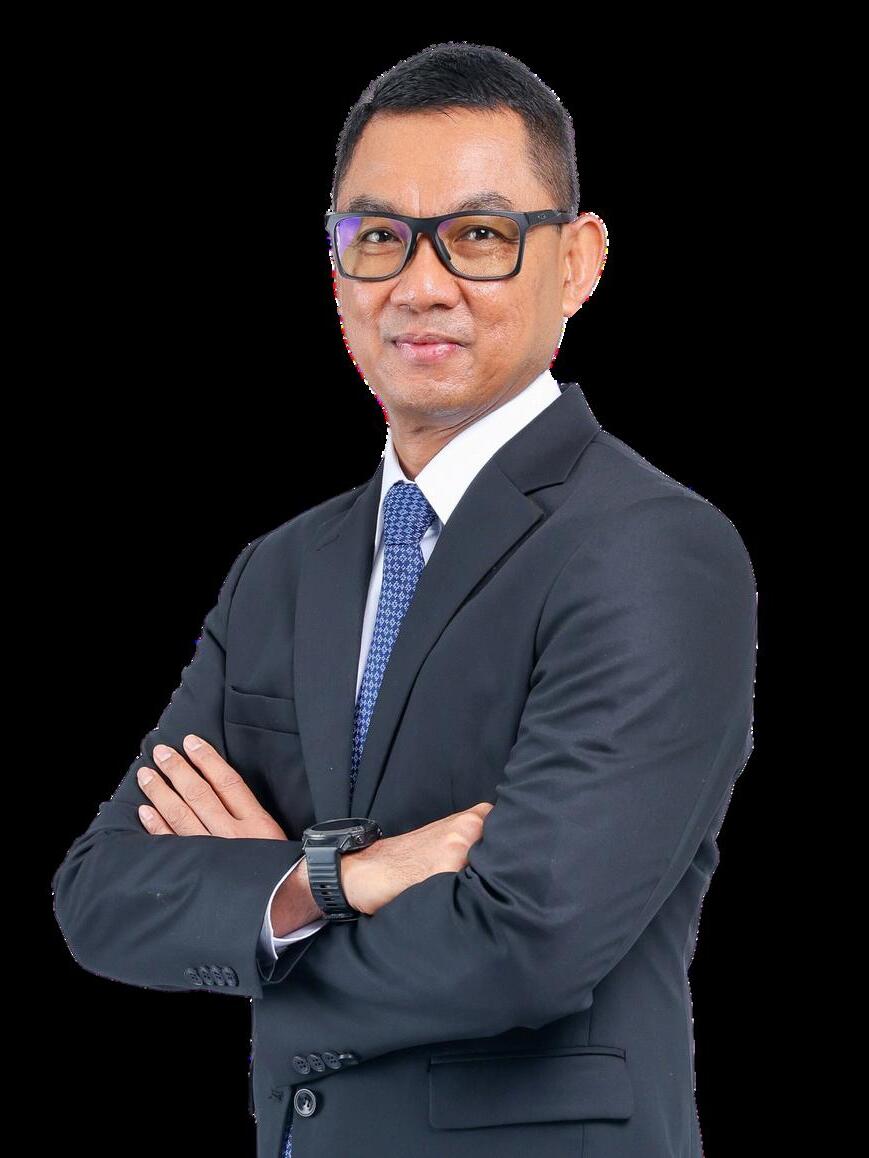

Building a Collaborative Energy Ecosystem in Vietnam
Under the Technical Working Group 3 of the Vietnam Energy Partnership Group, the Alliance has established a BESS Taskforce to identify best practices, share international experiences, and provide actionable recommendations to support the development and scale-up of BESS. The taskforce will focus on enhancing legal, regulatory, technical, and financial frameworks, contributing to Vietnam’ s PDP8 target of achieving 300 MW of BESS capacity by 2030.
With the National Economics University, The Asia Foundation, and Pacific Rim Investment and Management Inc., we recently launched the Made-in-Vietnam Energy Plan 4.0. This strategic document lays out a roadmap that focuses on strengthening Vietnam’ s competitiveness, addressing investment-related barriers, and fostering a reliable, low-emission, and affordable power system.
To further accelerate decarbonization and promote energy independence, the Alliance will also focus on scaling up renewable energy and BESS in industrial parks
Regional Update: Latin America and
the Caribbean
Approximately 16 million people across Latin America and the Caribbean (LAC) still lack access to electricity. Another 60 million experience unreliable service, affecting everything from education to healthcare and economic stability. However, this challenge also presents a historic opportunity one that could make LAC the first developing region to achieve universal electricity access.
Engaging Communities for Clean Energy in Belém
The Energies of the Amazon Conference held in Belém, Brazil, by the Ministry of Mines and Energy marked an important step on the road to COP30. The event saw the launch of two major initiatives the auction for isolated systems and the selection process for PróAmazônia Legal, both critical components of a program to improve energy reliability for 3 million people across the Amazon region. The conference placed a strong emphasis on social impact and community inclusion Direct participation from local leaders, along with field visits, brought greater depth of understanding and urgency to the discussions. It highlighted how energy access has transformed lives and reinforced the importance of engaging communities from the outset to sustain long-term benefits.
City, Vietnam

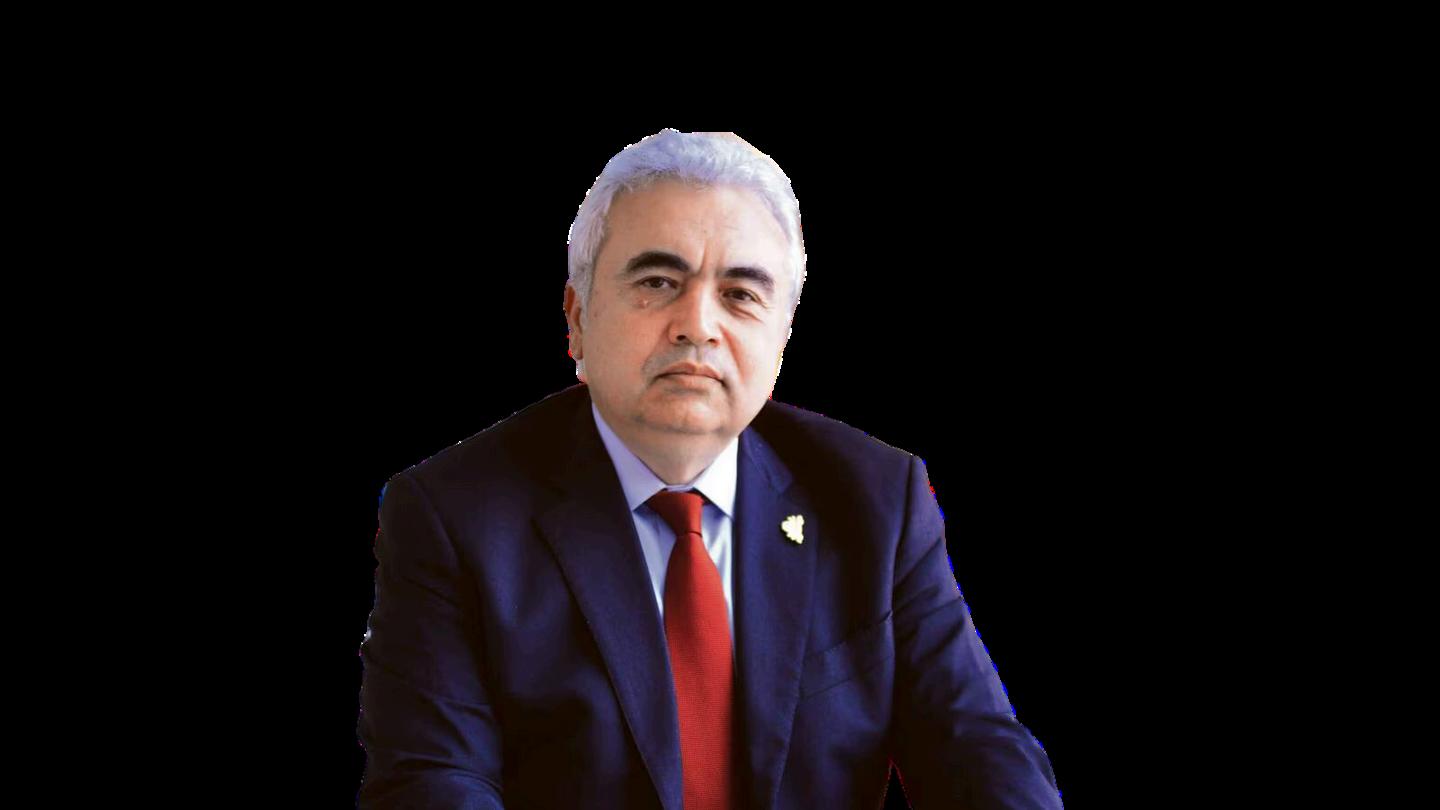
Floating Solar Power Plants: Advancing Energy Transition in Indonesia
Indonesia’s Batam-Bintan region represents a critical frontier in the nation’s energy transition strategies. With an average 6.6% growth rate between 2010 to 2019, the surging energy demand has the region’s current 59732 MW power supply operating at near peak capacity, making sustainable solutions an imperative.
The Tembesi Floating Solar Power Plant in Indonesia, supported by PT Sarana Multi Infrastruktur (PT SMI) and GEAPP, provides a transformative opportunity for accelerating progress toward multiple national and global priorities:
Reducing reliance on conventional fuels and diversifying the energy mix
Expanding renewable energy capacity to 60 MW across Batam, Galang, and Rempang islands
A just and inclusive peoplepositive transition
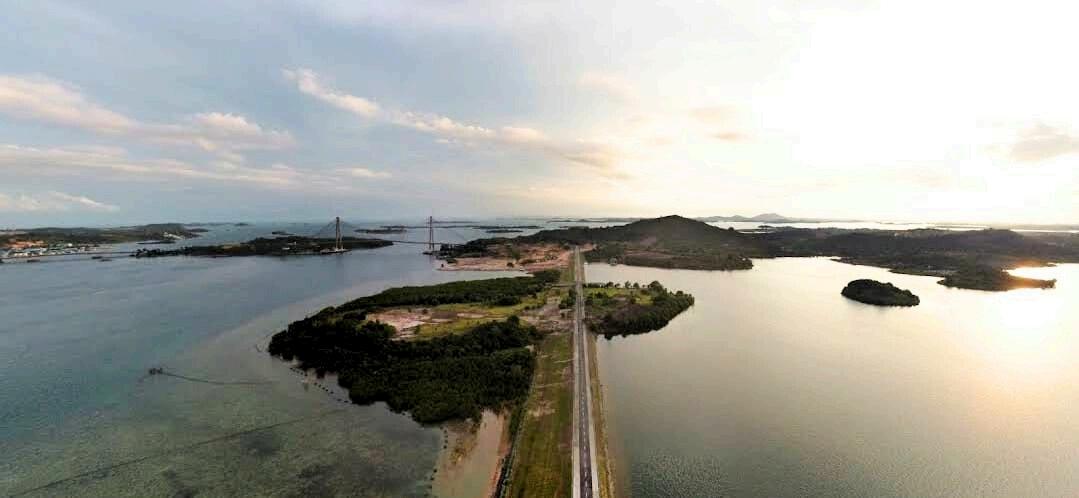
Initially providing 30 MW of green energy to Batam City, the project has the potential to scale up to 333 MW. The Alliance’s catalytic USD 715,000 grant will enable PT SMI to mobilize USD 2667 million for the project, underscoring the power of public-private-philanthropic collaboration in accelerating the energy transition.
Beyond infrastructure, the initiative will drive long-term sustainability and socio-economic benefits by supporting feasibility studies, grid assessments, and environmental impact analyses, and enhance private-sector engagement while fostering community empowerment and green job creation.
renewables energy mix by 2025 23%
56.5 GWh
43,807 tons annual production greenhouse gas (GHG) emissions reduced annually

Alliance
Alliance
Battery Storage is Central to Scaling Renewable Energy in Africa
Dr. Lazarus McCarthy Chakwera, President of Malawi and Woochong Um, CEO, GEAPP
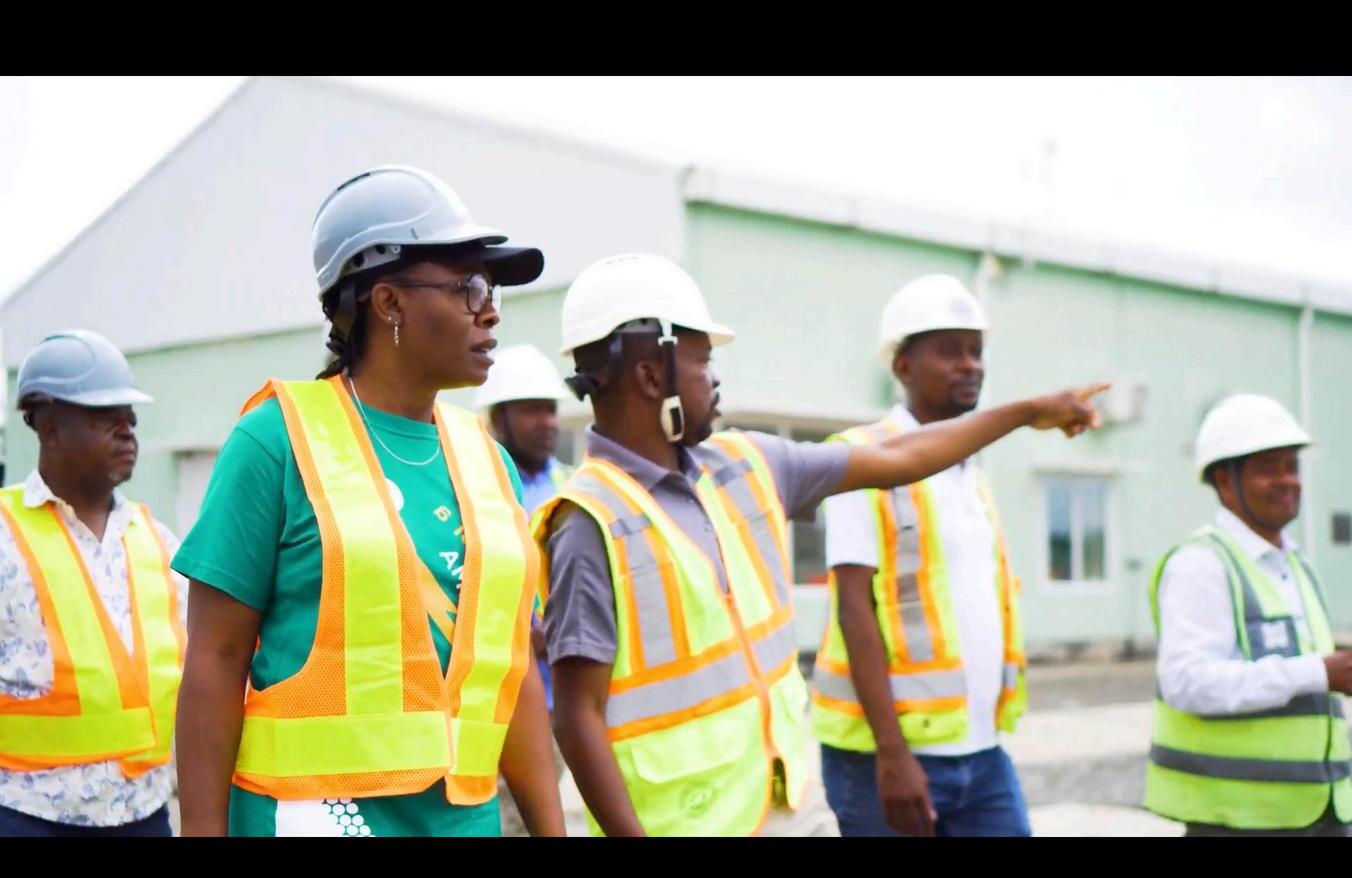
Key to Universal Energy Access Is Green
Ingrid-Gabriela Hoven, Managing Director, GIZ and Francesco La Camera, Director General, IRENA
There is an urgent need to accelerate the global energy transition to meet climate goals and achieve universal energy access. 685 million people still lack access to electricity, and over 2 billion rely on hazardous cooking fuels Distributed renewable energy (DRE) solutions offer a scalable, cost-effective, climate-friendly alternative to centralized grids DRE systems are especially suited to rural and underserved areas, enabling electrification, supporting local economies, and reducing emissions
India’s renewables push holds lessons for the
world
Dr. Rajiv Shah, President, The Rockefeller Foundation and Woochong Um, CEO, GEAPP
India’s achievement of 100% rural electrification and its push for renewable energy offers valuable lessons for global energy transitions. With noteworthy advances in BESS to stabilize supply, scaling DRE, and modernizing utilities for better service delivery, India’s energy transition journey is about more than just meeting targets



Africa must look beyond grants for energy, climate financing
Closing the green energy investment gap requires innovative financing structures. We leverage a wide range of blended finance and flexible capital solutions, enabling organizations to co-invest and multiply funds. By deploying our agile capital we test ideas, scale them, and create momentum around these sectors to drive sustained, irreversible change. Our approach is designed to nurture projects, mobilize additional funds, and demonstrate successful transactions that attract more capital.

Viksit Bharat 2047: Roadmap to Clean Energy Future
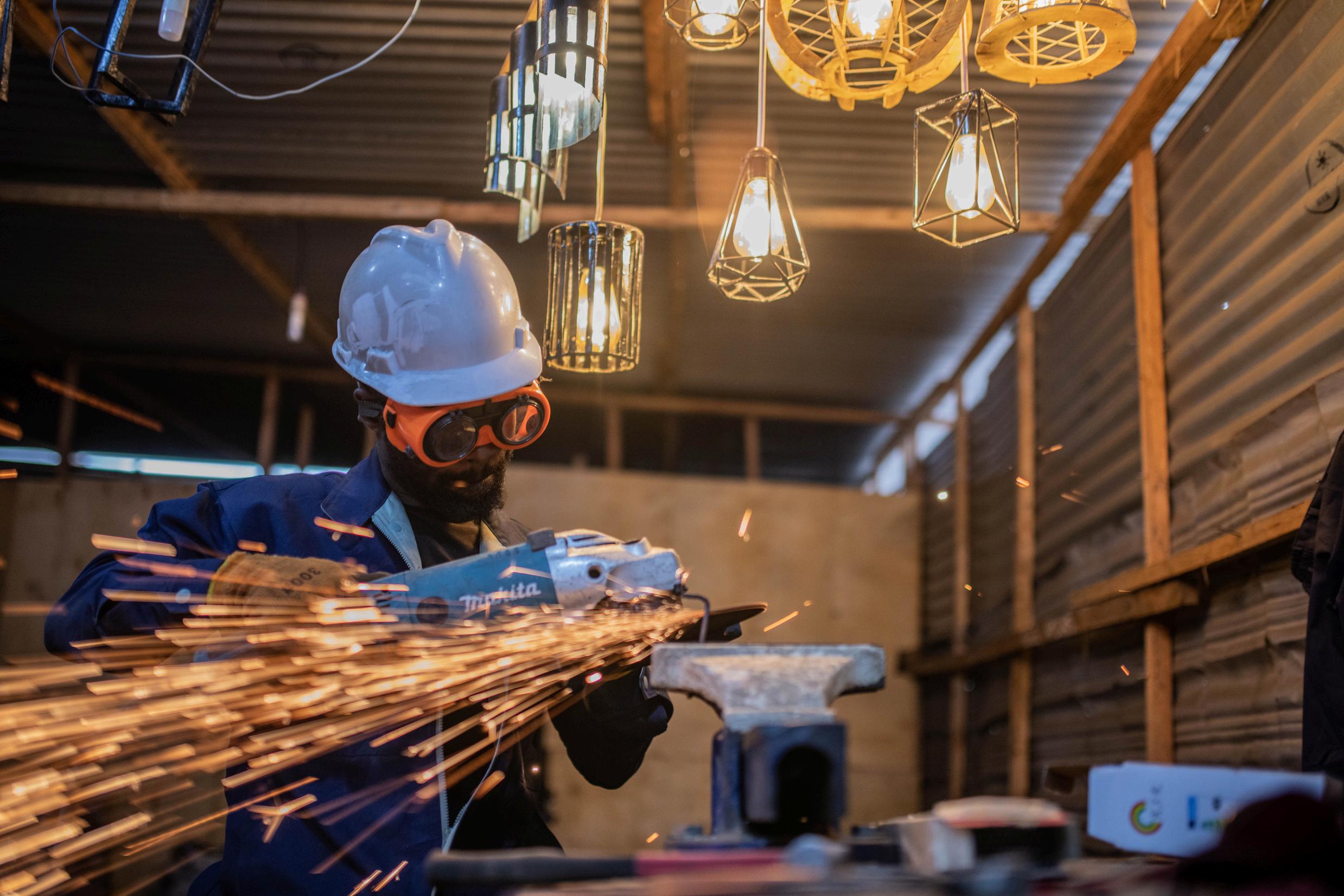

Innovative financing can ratchet up climate ambition in uncertain times
Southeast Asia needs massive climate investment to meet Paris Agreement goals To overcome funding hurdles like geopolitics and debt, innovative financing models involving public, private, and philanthropic sectors are crucial Collaborative and cross-sectoral initiatives are the need of the hour to bridge funding gaps, de-risk projects, and accelerate the region's green energy transition
Saurabh Kumar, Vice President, India, GEAPP
Kitty Bu, Vice President, Southeast Asia, GEAPP
Dr. Damola Omole, Director of Utility Innovation, GEAPP
MiniGrids PoweringGreen Growthfor the LastMile
Howa World Bank program is changing lives across the world
Standing by his newgrinding mill in rural Kenya, Hesbon Apoyah beams with pride. Beforethe arrival of electricity, villagerstraveled long distancestomill their grain Now, thankstoa solarpowered mini grid, lifeand work have become so much easier. “Being able tosetthis up here has really changed people’ s lives,” he says.
Apoyah’ s story is part of a larger transformation across Africa, wheremini grids are increasingly providing affordable, reliable electricity topower businessesand sustain jobsin remote communities. With 685 million people worldwide lacking electricity — morethan 80 percentof them in Sub-Saharan Africa — mini grids arean importantpart of the solution alongside solar home systems and national grid expansion
Mini Grids Help GenerateIncome If Investments Flow
Globally too, mini grid deploymentis growing with the sector evolving from providing electricity alone tofostering broader rural development. Business models have expanded to include appliance financing and the use of electricity togenerateincome
Between 2018 and 2024, the shareof diesel as a mini grid power source fell from 42 to 29%, while solar photovoltaic rose from 14 to 59%, driven by falling pricesof solar PVand lithiumion batteries. With that, mini grids’ financial viability has improved, and privateinvestmenthas increased sixfold since 2015.
Yet, a significantfinancing gap remains. Total funding surpassed $2.5 billion in 2023, with ongoing programs totaling over $3.1 billion across close to 380 initiatives, mainly in SubSaharan Africa. However, high subsidiesof an average $411 per connection and varying program durations highlightthe need for further investment


Streamlining Regulations, Creating Jobs
Toenable such investments, the Energy Sector ManagementAssistance Program (ESMAP), the World Bank trust fund focused on solving energy challengesin emerging and developing markets, is working with governments tocreate predictable business environments where profitable businessescan flourish.
Countriessuch as Nigeria, Angola, Ethiopia, Kenya, and Zambia have adopted regulatory frameworkstoenable setting up mini grids, but implementation remains a challenge. This is why ESMAP is helping governments simplify regulatory processes, including exemptions for smaller systems and longer licensesto attractcommercial financing.
In Support ofMission 300
ESMAP workswith governments to develop national electrification strategies and least-cost access plans that arecritical toachieving Mission 300, the World Bank’ s commitmenttodeliver electricity to 300 million Africans by 2030.
“Wefacilitatetechnical assistance, feasibility studies, and projectdesign, ensuring efficientresource allocation,” says ESMAP Practice Manager Fanny Missfeldt-Ringius.
The unveiling of 12 Energy Compacts earlier this year, detailing government plans for accelerated electricity access based on ESMAP-supported national strategies, marked a milestone in this endeavor.
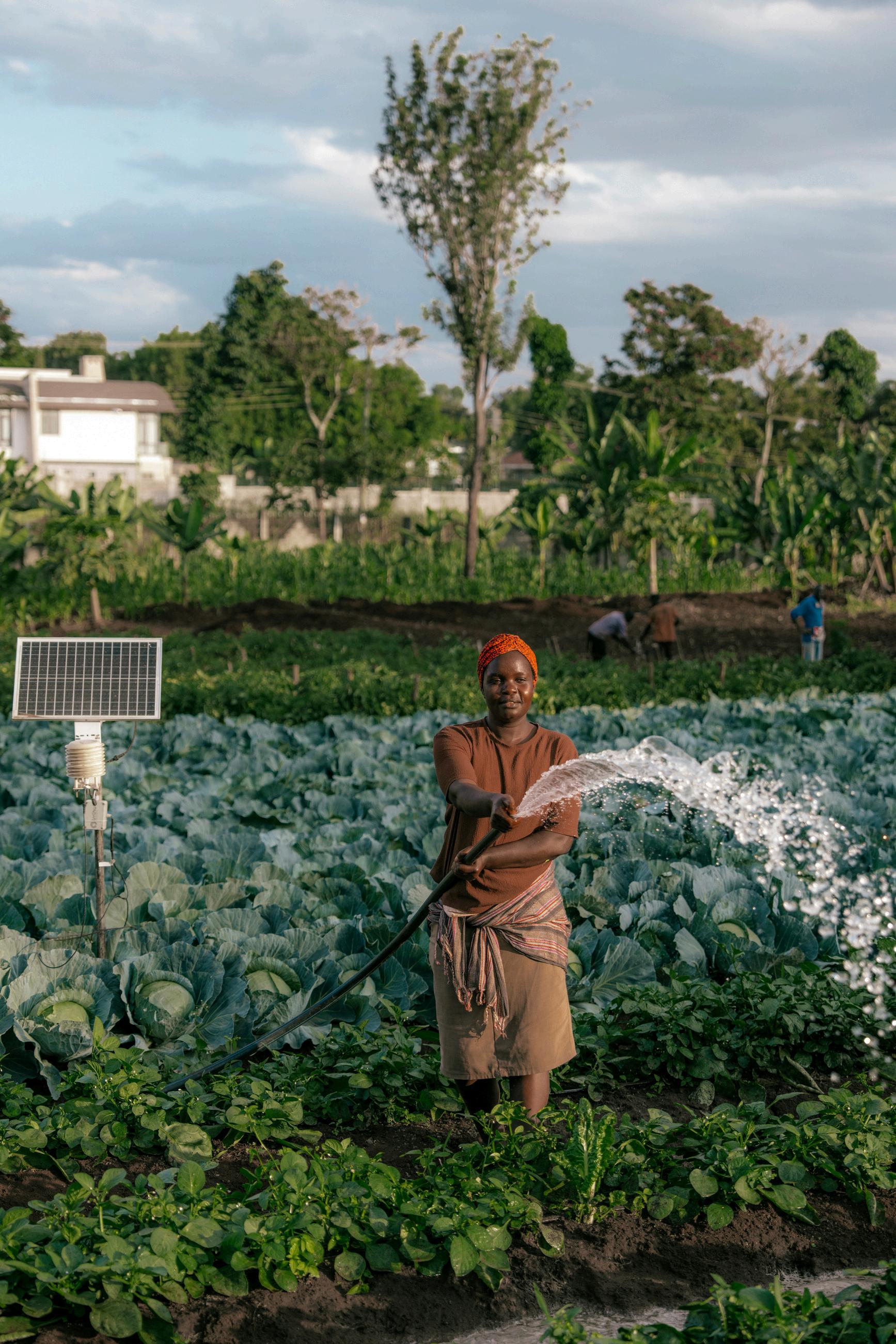

Innovation, Technology, Financing, Scaling
toconducivebusiness environments national strategies, technological advancesmakemini grids increasingly Solar hybrid generation, smart meters, and remote monitoring provide reliable, affordable power with uptimesof 90-95%. Mesh grids, wherenearby households areinterconnected toshare , arecutting installation costsby quarters.
Innovativefinancing options, such as blended finance, arelowering investment while one-stop platforms and portfolio bundling arestreamlining project ecution. Aggregation platforms are for scaling up, helping developers capitalizeon economiesof scale and reduce costs. mini grids aremorethan an energy solution — they driveemployment, economic productivity, and decarbonization. With the rightmix of regulatory support and innovative financing, these systems can bridge the y gap and fuel growth and jobsin underserved communities.
Unlocking New Frontiers
Not everyone has the same chance to innovate, learn and thrive. These Alliance-led initiatives are delivering new opportunities for all, especially women and young people.
Energizing Women and Youth in Agri-Food Systems
Despite their critical role in feeding the continent, African women, comprising about 60% of the agricultural workforce (UN Women, 2024), face significant barriers to accessing energy and modern agricultural tools. Additionally, Africa’s agriculture uses only 2% of the continent’s electricity, forcing farmers to rely on rain-fed farming and manual processing. This increases climate vulnerability, reduces yields, and limits earnings To address these challenges, the Mastercard Foundation and GEAPP are collaborating on Energising Women and Youth in AgriFood Systems (EWAS) a three-year program to enable 17,000 jobs in the agri-food systems in Ethiopia and Nigeria through access to green energy, technology, training, and finance.
Ethiopia and Nigeria were selected as the program ' s initial focus due to the opportunity presented by energy access programs, the central role of agriculture in their economies, and the tremendous size of their rapidly growing populations. With a combined rural population exceeding 200 million people, these two nations offer an outsized opportunity to demonstrate the transformative impact of EWAS at scale.
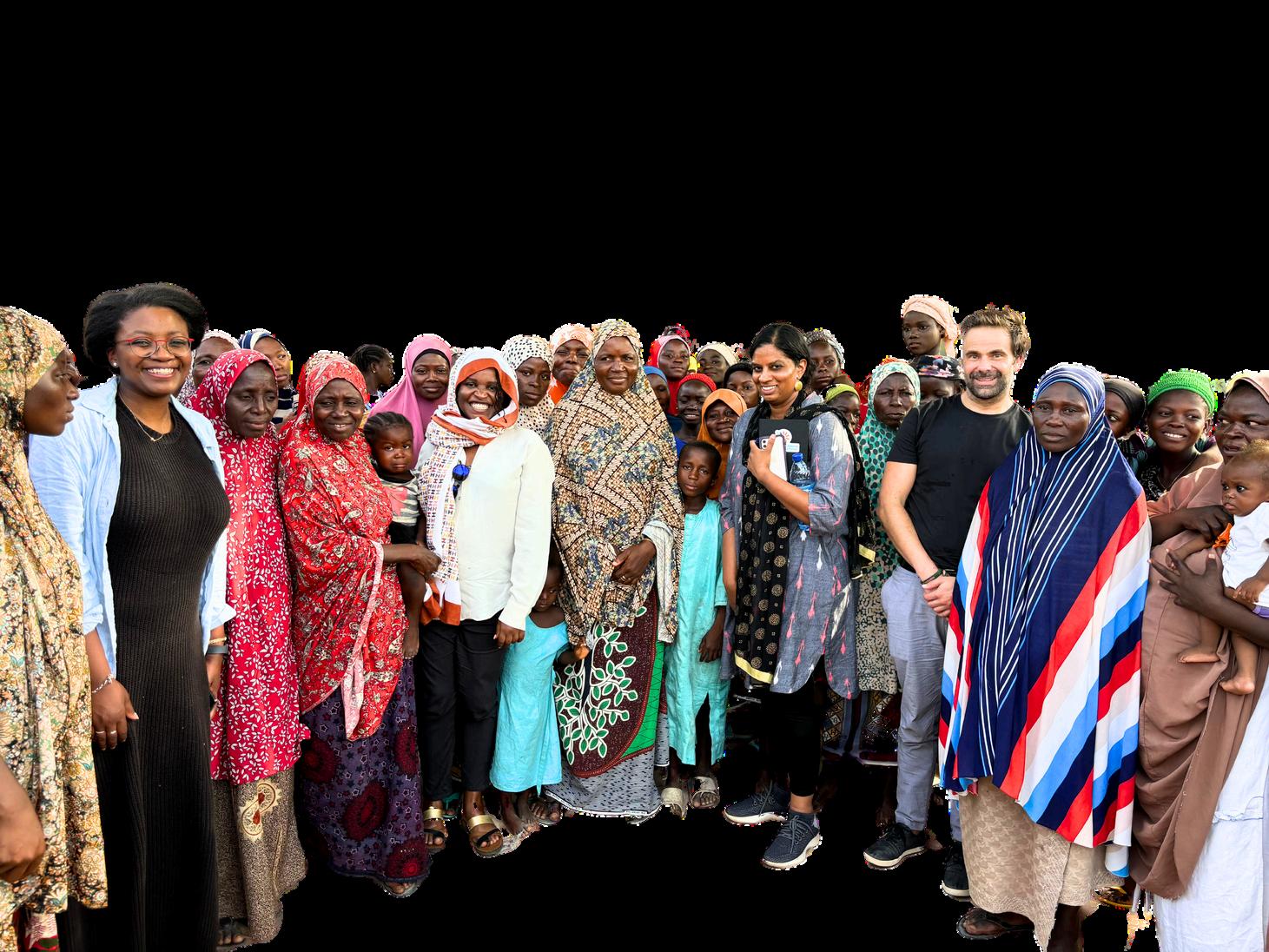
Our Alliance’s interventions aim to improve access to productive use of energy (PUE) equipment for young women by lowering their costs through catalytic funding, support young women in integrating PUE technologies into their agri-business activities, thereby improving incomes, and build the capacity of PUE equipment and energy supply enterprises to effectively reach and serve young women engaged in agriculture
Energy Transitions Innovation Challenge
India needs approximately US $300 billion to meet its ambitious climate targets While India has a massive startup ecosystem, interest from investors is often low during project funding, and climate ranks ninth in terms of priorities for investors. There is a need for funding to reach scalable renewable energy projects and reduce the gap between funding and innovation.
Energy Transitions Innovation Challenge (ENTICE), GEAPP’s flagship initiative launched in 2023, is a challenge dedicated to supporting India’s burgeoning startup ecosystem by nurturing innovative solutions and bridging funding gaps. The platform brings together investors, solution providers, and enablers to enhance access to market linkages, funding, and mentorship. Building on the learnings of the inaugural edition, the second edition was launched in January 2025
We operate in a Consortium approach with multiple partners, including the government, private sector, and finance organizations. Together, we are accelerating innovation in India’s climate infrastructure space.
The challenge statements for this edition focus on the development of an AI-powered tool to analyze behind-the-meter energy consumption patterns and create a digital twin of appliances, and consumption patterns from existing smart meter data, and identify large-scale flexible assets and operational inefficiencies in industrial settings.
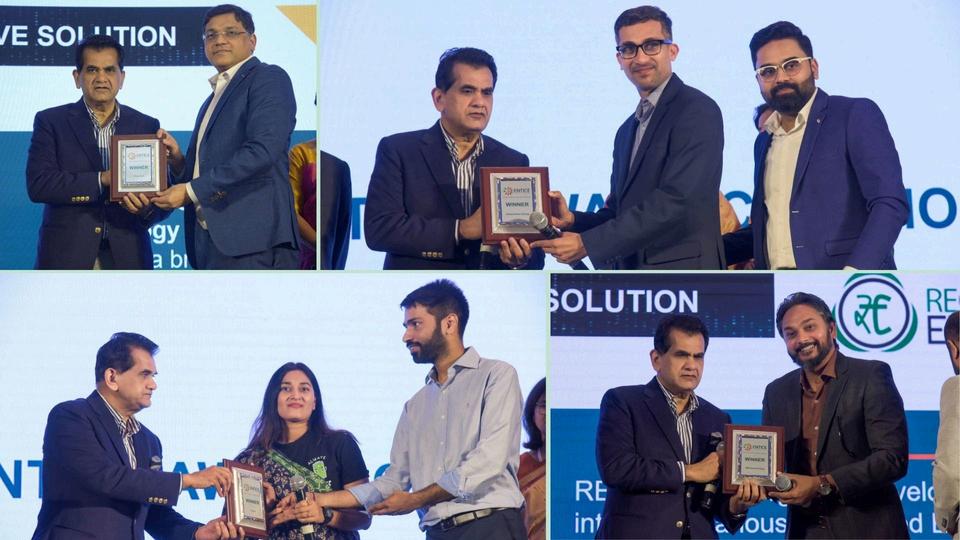
Winners of ENTICE 1.0 receive their awards from Amitabh Kant, G20 Sherpa, India. Clockwise from top left: VFlowtech, AmpereHour Energy, Cancrie, REConnect
Winners of ENTICE 1.0 receive their awards from Amitabh Kant, G20 India. Clockwise from left: VFlowtech, AmpereHour Energy, Cancrie, REConnect
Enhancing Access to BESS for Low-Carbon Economies (ENABLE)
As ASEAN nations continue to pursue their renewble energy targets, strengthening storage infrastructure becomes imperative to meet surging demand amidst the growing share of variable renewable sources The ENABLE platform is an ambitious initiative accelerating BESS uptake in Southeast Asia. Developed as a collaborative effort of ADB and GEAPP, the platform brings together diverse stakeholders to address critical market barriers, create bankable projects, and enable conditions for private investment in BESS
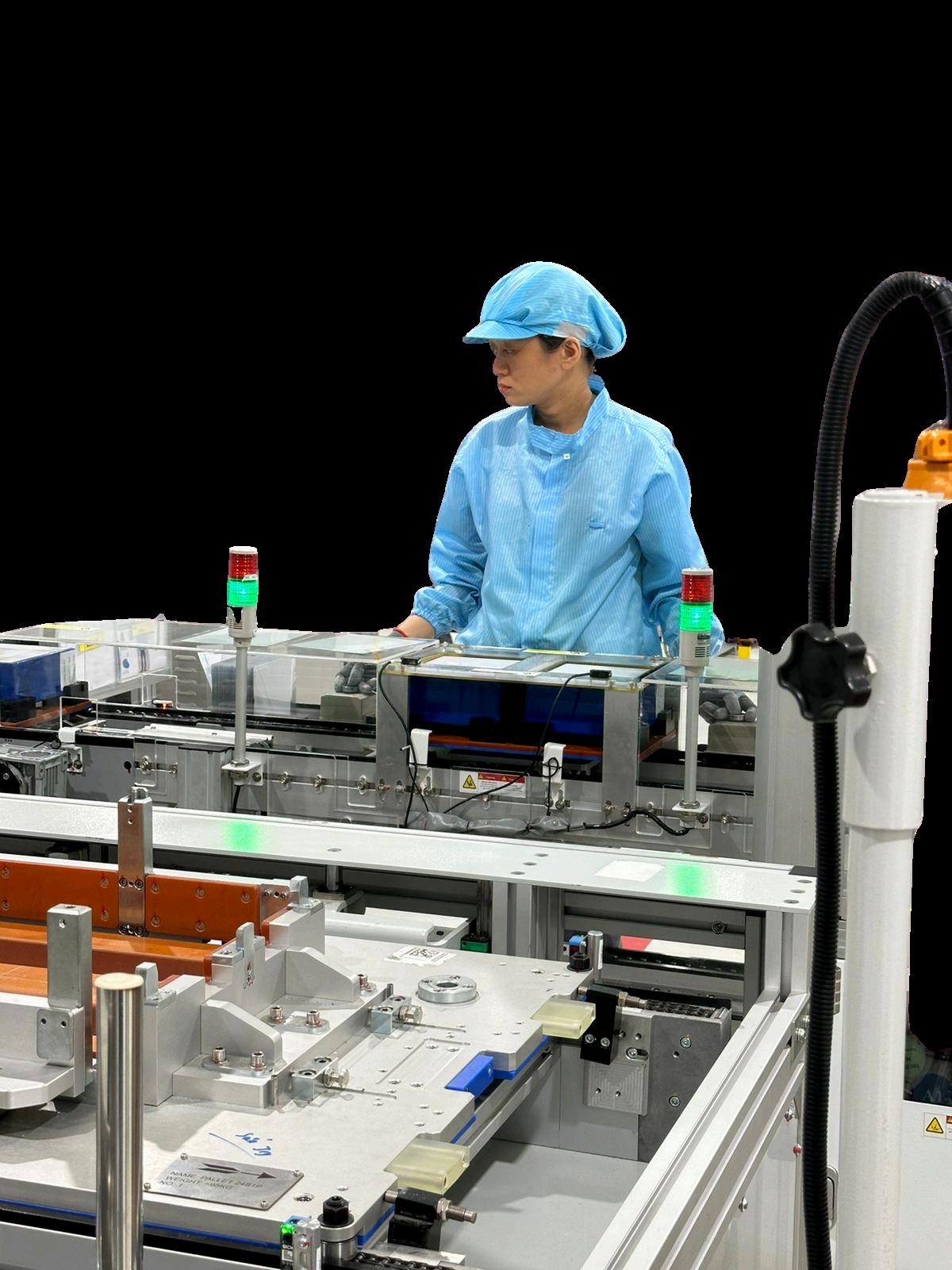
Adopting a comprehensive approach that includes technical assistance, pilot project preparation, and capacity-building initiatives for key stakeholders, ENABLE will help accelerate battery storage adoption, enhance technical understanding, reduce capital costs, address concerns about cost impacts on consumers, and facilitate access to concessional financing all critical for Southeast Asia to reach its clean energy targets.
ENABLE brings together diverse stakeholders and innovative financing approaches to establish a replicable project development model that will support the region' s long-term clean energy transition while creating economic benefits across Asia and the Pacific.
Unlocking energy, jobs and opportunity for Africa’s growing young population #Mission300
Of the 685 million people across the world who lack access to electricity, nearly 600 million live in sub-Saharan Africa. Students are unable to study after nightfall. Businesses cannot thrive. And local and national economies falter for want of power to run businesses, create jobs and grow.
At the same time, Africa has the world’s fastest growing, and youngest, population. More than 60% of people are under 25 years old. According to the UN’s Economic Commission for Africa, the continent’s youth population is expected to grow by 138 million in the next 25 years.
This is both a huge challenge — and an opportunity. At the current rate of growth, Africa will not be able to create enough good, dignified jobs for its growing population. And with so many lacking access to both electricity, and to the finance, training and business support to accelerate its uptake, realizing the necessary economic growth will be hard.
Mission 300 is a bold initiative to connect 300 million Africans to electricity by 2030. By pooling resources, influence, and expertise and partnering with governments, businesses, and communities we are transforming energy markets, scaling finance, and helping governments set and deliver on national energy goals.
And we are committed to ensuring electricity access is paired with the right tools, finance, and training to upskill a dynamic young workforce and spark a ripple effect of innovation, entrepreneurship, and jobs.

Having electricity is very important. If I want to fabricate metal to any extent, I’m able to do it because there’s plenty of electricity.
–Jacob Mukunukuji, a young technical apprentice in Zimbabwe

Fueling Economic Growth in Nigeria
People without electricity need both access and the means to use it at the Modern Energy Minimum of 1,000 kWh per person annually In Nigeria, where half the population lacks power, rural mini grids offer the lowest-cost solution. However, the average mini grid user consumes just 100 kWh per year, spending only $17 annually insufficient to sustain the system. Underutilization drives up energy costs by up to $0.60/kWh, threatening the viability of distributed renewable energy and putting nearly $25 billion in electricity access investments at risk by 2030
The Energizing Agriculture Program (EAP) helps rural Nigerian communities leverage electricity for agriculture, improving livelihoods and strengthening the economics of mini grids. Nearly 50 mini grids had been deployed, but most lacked a demand-support strategy or relied solely on developers to finance and deploy PUE equipment. To address this, the Nigerian Rural Electrification Agency (REA), the Rocky Mountain Institute (RMI), and GEAPP established EAP, convening energy and agriculture stakeholders to develop a pipeline of ready-to-build projects. Additionally, we launched an Agriculture-Energy Innovation Accelerator to scale profitable agricultural energy use and a Demand Unit Pilot program to stimulate demand across mini grids.
The Demand Unit Pilot connected mini-grid developers with PUE providers, while the Agriculture-Energy Innovation Accelerator fostered a commercially viable PUE sector by integrating agricultural expertise with energy deployment. EAP’s success and insights directly informed the development of EWAS interventions in Nigeria to offer further support to the PUE sector and local communities.

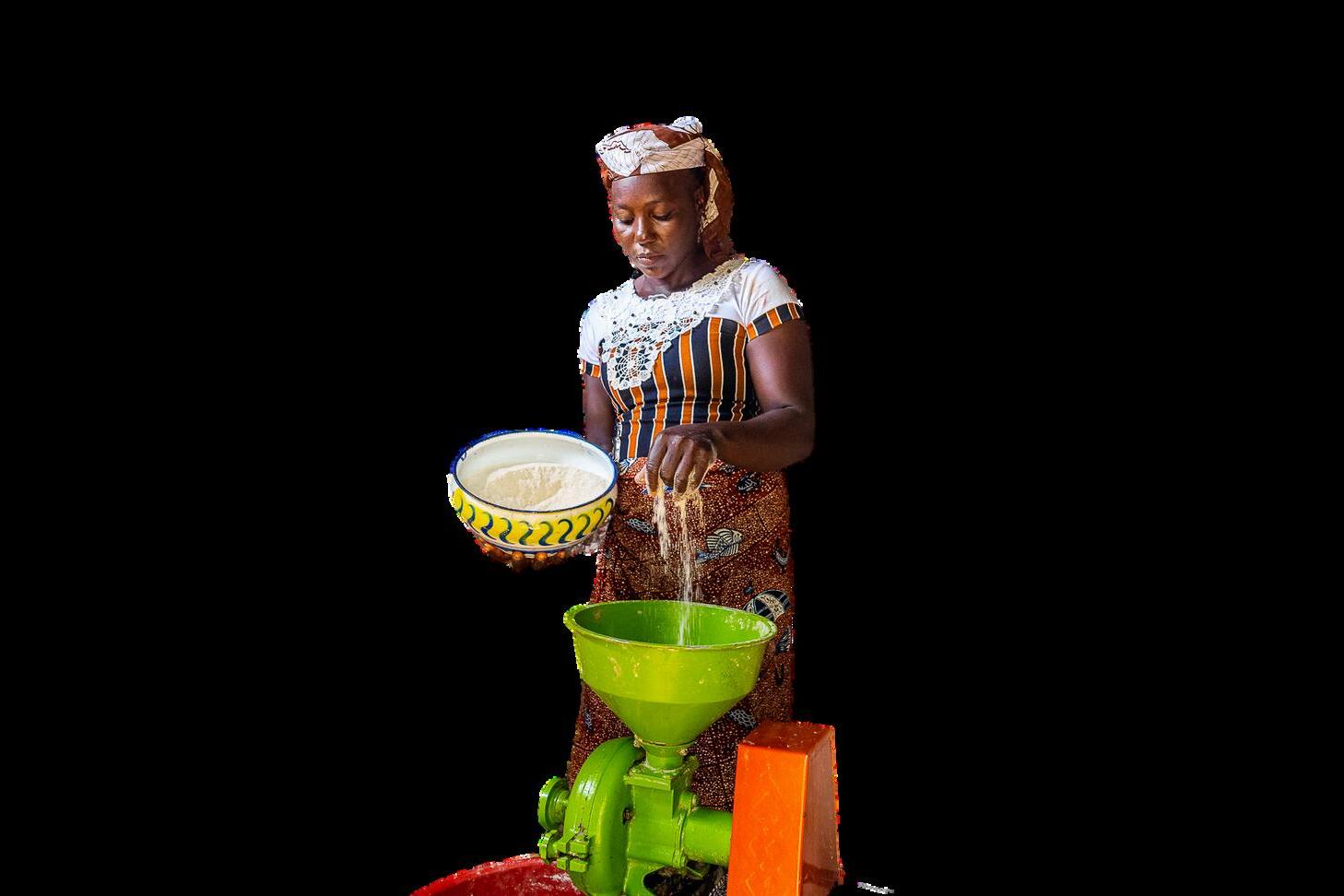
Knowledge Hub
The latest reports and publications from across the Alliance
Rooftop solar systems not only support business resilience but also foster environmental sustainability. This handbook showcases the potential of RTS for enabling enterprises to reduce costs, improve productivity, and adopt more advanced technologies Download the report here.
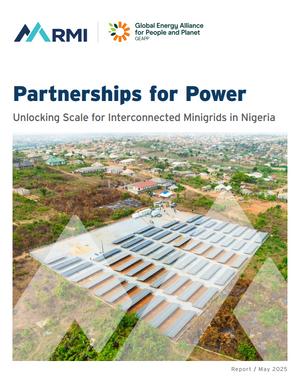
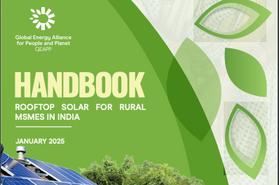
Interconnected mini grids are a “win-win-win” value proposition for utilities, developers, and communities. This report presents a comprehensive analysis of pioneering IMG projects in Nigeria, highlighting their transformative potential to improve electricity access, reliability, and affordability. Four pilot IMGs have added 3 MW of solar PV and 3 MWh of battery storage, serving over 6,300 urban and peri-urban connections. Read more.
The state of Rajasthan, India showcases immense potential for leading a clean energy shift With the Alliance’s catalytic support for the PM-KUSUM scheme, the state government has deployed over 240 solar plants and reached 177,000 farmers, unlocking new economic opportunities. This impact report captures how clean energy can fuel inclusive growth and climate resilience, offering a replicable model for India’s energy future. Download the report here.
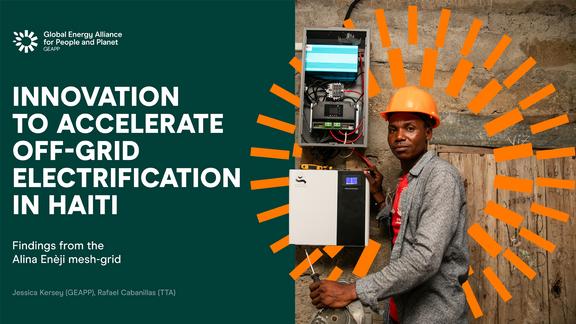
Mesh grids, stand-alone solar systems, and traditional alternating current grids, when integrated, form a cohesive energy network that meets diverse community needs and drives local economic development. This paper explores mesh grids as a bottom-up, decentralized electrification model and evaluates the social, technical, financial, and economic performance of the system. Download the report here.
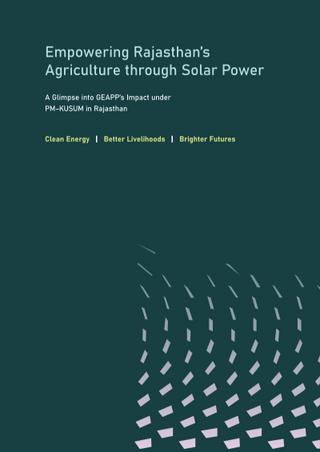
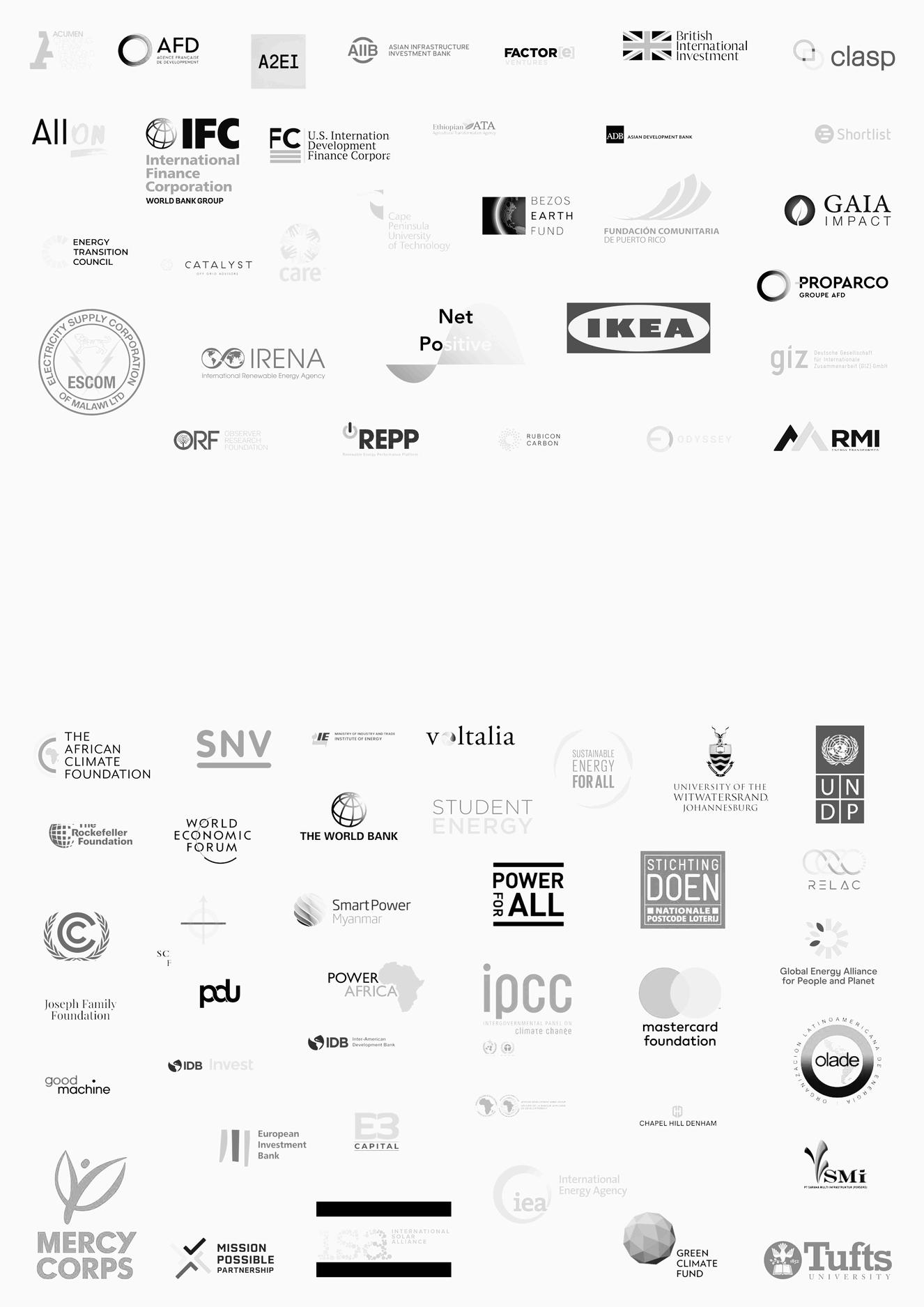
Transformation is only possible through an Alliance of extraordinary partners.
As an Alliance, GEAPP puts collective action first.
With our partners, we align goals, pool resources and share expertise across borders and sectors, so we can transform energy markets and drive lasting, systemic change.
That's the power of collaboration.

P WERISE








